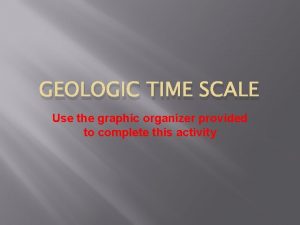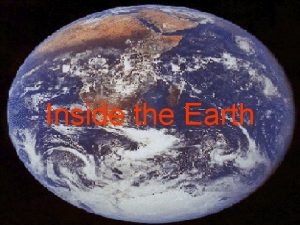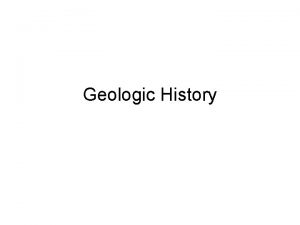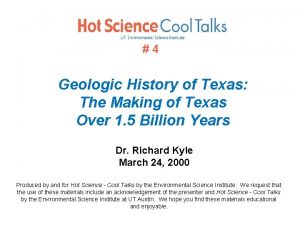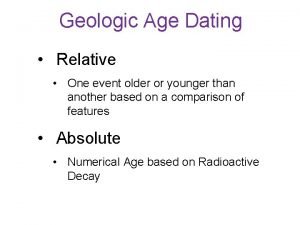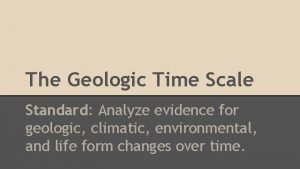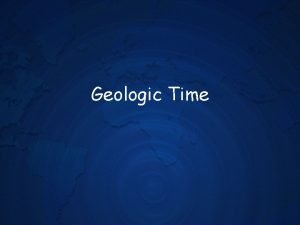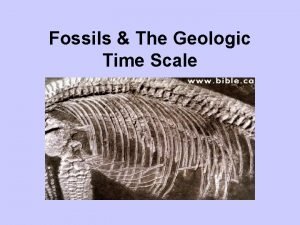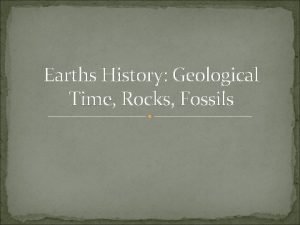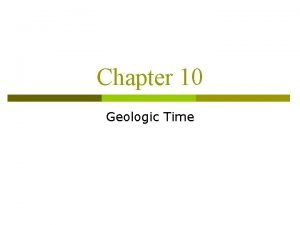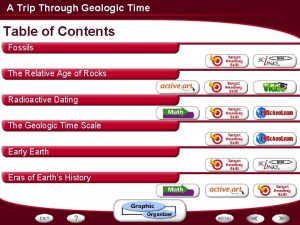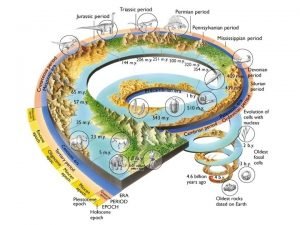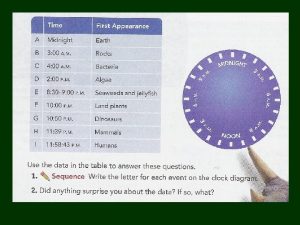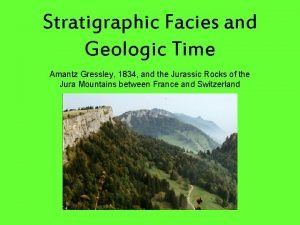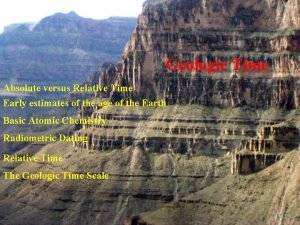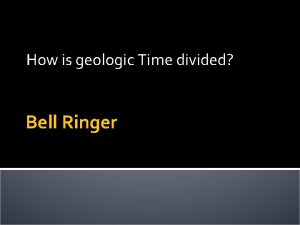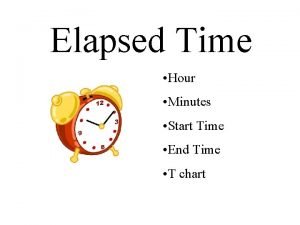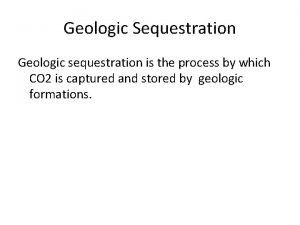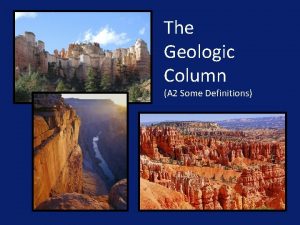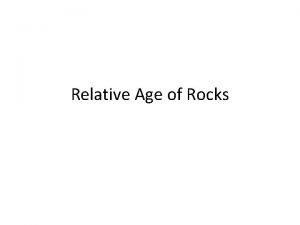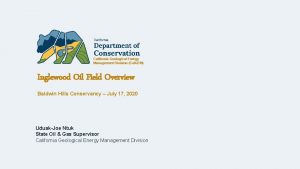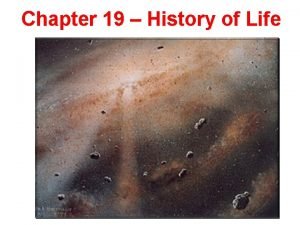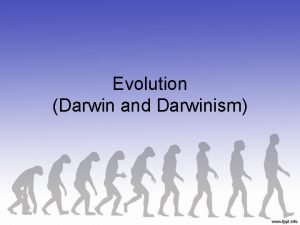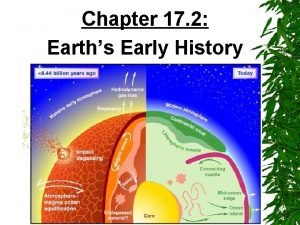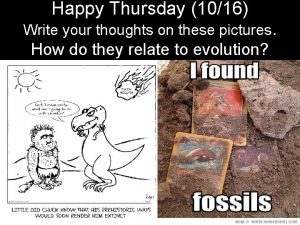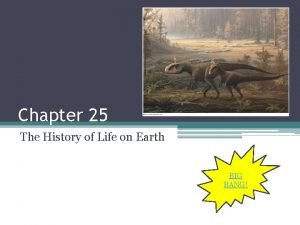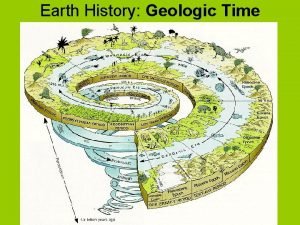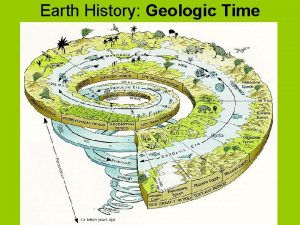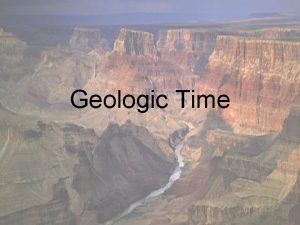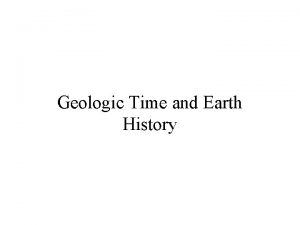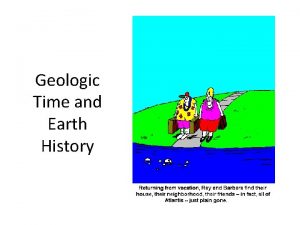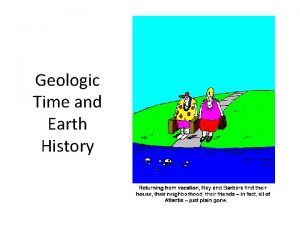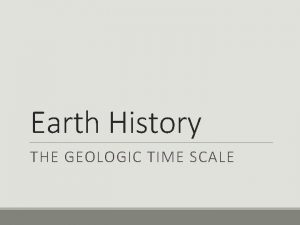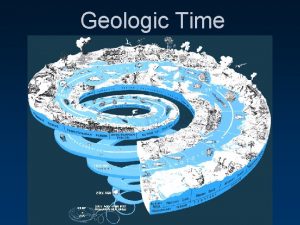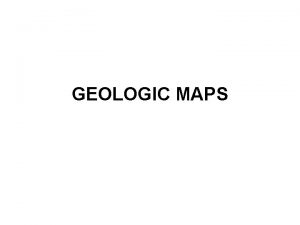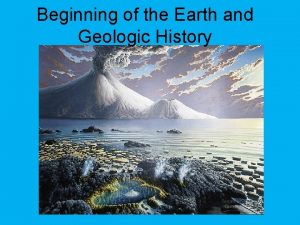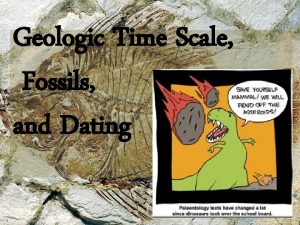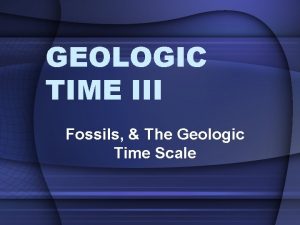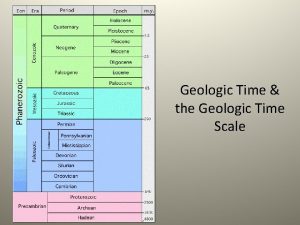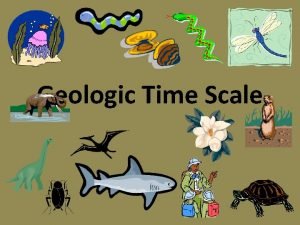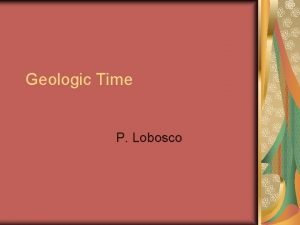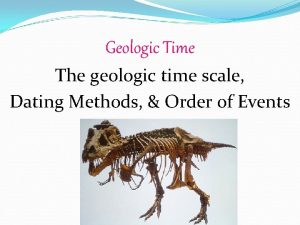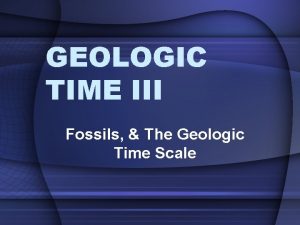Geologic Time and Earth History Two Conceptions of





































- Slides: 37

Geologic Time and Earth History

Two Conceptions of Earth History: Catastrophism • Assumption: Great Effects Require Great Causes • Earth History Dominated by Violent Events Uniformitarianism • Assumption: We Can Use Cause And Effect to Determine Causes of Past Events • Finding: Earth History Dominated by Small-scale Events Typical of the Present. • Catastrophes Do Happen But Are Uncommon

Uniformitarianism Continuity of Cause and Effect • Apply Cause and Effect to Future Prediction • Apply Cause and Effect to Present Technology • Apply Cause and Effect to Past – Uniformitarianism The Present is the Key to the Past

Ripple Marks, Bay Beach

Fossil Ripple Marks, Baraboo Range

Modern Mud Cracks

Fossil Mud Cracks, Virginia

Two Kinds of Ages Relative - Know Order of Events But Not Dates • Civil War Happened Before W. W. II • Bedrock in Wisconsin Formed Before The Glaciers Came Absolute - Know Dates • Civil War 1861 -1865 • World War II 1939 -1945 • Glaciers Left Wisconsin About 11, 000 Years Ago

Superposition: Mindoro Cut, Wisconsin

Geologic Map

Fossils Remains of Ancient Plants And Animals, Evidence of Life

Commonly Preserved: Hard Parts of Organisms: • Bones • Shells • Hard Parts of Insects • Woody Material

Rarely Preserved Soft or Easily Decayed Parts of Organisms: • Internal Organs • Skin • Hair • Feathers

Types of Fossils • • • Original Material Casts & Molds Replacement (Petrified Wood) Carbonized Films (Leaves) Footprints, Tracks, Etc. – “Trace Fossils” – Our only preserved record of behavior of fossil organisms

Dinosaur Tracks, Texas

Rubbing Rock? Wisconsin

Rubbing Rock? California

Pseudofossils Look Like Fossils But Aren't • Dendrites • Concretions

Pseudofossils

Natural or Sculpture?

Johannes Beringer’s “Fossils”

Beringer’s Book

Where Fossils Occur Almost Exclusively in Sedimentary Rocks • Heat of Melting or Metamorphism Would Destroy Almost Every Type of Fossil • Rare Exceptions: – Some Fossils in Low-grade Metamorphic Rocks – Trees Buried by Lava Flow To Be Preserved, Organisms Have to Be: • Buried Rapidly After Death • Preserved From Decay

Fossil Tree in Lava Flow, Hawaii

Good Index Fossils • Abundant • Widely-distributed (Global Preferred) • Short-lived or Rapidly Changing

Correlation

The Geologic Time Scale Quaternary Latin, “fourth” 1822 Tertiary Latin, “third” 1760 Cretaceous Latin creta, “chalk” 1822 Jurassic Jura Mountains, Switzerland 1795 Triassic Latin, “three-fold” 1834 Permian Perm, Russia 1841 Carboniferous Carbon-bearing 1822 Devonian Silurian Devonshire, England Silures, a pre-Roman tribe 1840 1835 Ordovician Ordovices, a pre-Roman tribe 1879 Cambrian Latin Cambria, “Wales” 1835

Absolute Ages: Early Attempts Salt in Ocean • If we know rate salt is added, and how much salt is in ocean, can find age of oceans. Sediment Thickness • Add up thickest sediments for each period, estimate rate. Both methods gave age of about 100 million years • Problem: Rates Variable

Age of The Sun • If sun gets its heat from burning or other chemical reactions, could only last 10, 000 years or so. • Best 19 th century guess: sun was slowly contracting. • Problem: only 30 million years ago, sun would have extended out to earth's orbit! • Geologists wanted more time, but you can't fight the laws of physics. . . • Sun actually gets its energy from nuclear reactions and can keep going for billions of years • The Geologists were right after all. Go Team.

The Fundamental Rule of Absolute Ages The Earth is older than everything on or in it -Except its atoms -All ages are minimum ages

Radiometric Dating: Half-Life

Present Radiometric Dating Methods Cosmogenic • C-14 5700 Yr. Primordial • K-Ar (K-40) 1. 25 B. Y. • Rb-Sr (Rb-87) 48. 8 by • U-235 704 M. Y.

The Geologic Time Scale

Some Geologic Rates Cutting of Grand Canyon • 2 km/3 m. y. = 1 cm/15 yr Uplift of Alps • 5 km/10 m. y. = 1 cm/20 yr. Opening of Atlantic • 5000 km/180 m. y. = 2. 8 cm/yr. Uplift of White Mtns. (N. H. ) Granites • 8 km/150 m. y. = 1 cm/190 yr.

Some Geologic Rates Movement of San Andreas Fault • 5 cm/yr = 7 m/140 yr. Growth of Mt. St. Helens • 3 km/30, 000 yr = 10 cm/yr. Deposition of Niagara Dolomite • 100 m/ 1 m. y. ? = 1 cm/100 yr.

1 Second = 1 Year • • 35 minutes to birth of Christ 1 hour+ to pyramids 3 hours to retreat of glaciers from Wisconsin 12 days = 1 million years 2 years to extinction of dinosaurs 14 years to age of Niagara Escarpment 31 years = 1 billion years

Were The Dinosaurs Failures? Dinosaurs: 150, 000 years Recorded History: 5000 years • For every year of recorded history, the dinosaurs had 30, 000 years • For every day of recorded history, the dinosaurs had 82 years • For every minute of recorded history, the dinosaurs had three weeks
 Compare geologic time with the geologic column.
Compare geologic time with the geologic column. Graphic organizer about geologic time scale
Graphic organizer about geologic time scale Geologic layers of earth
Geologic layers of earth Original horizontality definition
Original horizontality definition Geologic history of texas
Geologic history of texas Principle of superposition
Principle of superposition Geologic history
Geologic history How is the geologic time scale organized
How is the geologic time scale organized Geologic time calendar
Geologic time calendar Geologic time scale animals
Geologic time scale animals Brainpop geologic time
Brainpop geologic time The longest subdivision of the geologic time scale is the
The longest subdivision of the geologic time scale is the Geologic time
Geologic time 4 divisions of geologic time
4 divisions of geologic time Geologic time scale drawing
Geologic time scale drawing Geologic time scale
Geologic time scale Geologic time
Geologic time Geologic time scale
Geologic time scale Geologic time scale poem
Geologic time scale poem Geologic time scale
Geologic time scale What is the longest subdivision in geologic time
What is the longest subdivision in geologic time 4 zoic eras
4 zoic eras Chapter 12 geologic time
Chapter 12 geologic time Spiritual conceptions
Spiritual conceptions Example of elapsed time
Example of elapsed time Geologic sequestration
Geologic sequestration Geologic column definition
Geologic column definition How do you determine the relative age of igneous rocks
How do you determine the relative age of igneous rocks Cal gem
Cal gem Faith reason and earth history pdf
Faith reason and earth history pdf Clock analogy of earth's history
Clock analogy of earth's history Section 17-2 earth's early history
Section 17-2 earth's early history 17-2 earth's early history
17-2 earth's early history Clock analogy of earth's history
Clock analogy of earth's history Define serial endosymbiosis
Define serial endosymbiosis Section 17-2 earth's early history
Section 17-2 earth's early history History of the earth
History of the earth Hhmi deep history of life on earth
Hhmi deep history of life on earth

